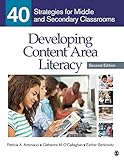Developing content area literacy : 40 strategies for middle and secondary classrooms / Patricia A. Antonacci,Iona College, Catherine M. O'Callaghan, Western Connecticut State University, Esther Berkowitz, St. Joseph's College.
Publisher: Los Angeles : SAGE Publications, [2015]Edition: Second editionDescription: xxix, 320 pages : illustrations ; 28 cmContent type:- text
- unmediated
- volume
- 9781483347646 (pbk. : alk. paper)
- 1483347648 (pbk. : alk. paper)
| Item type | Current library | Home library | Collection | Call number | Materials specified | Copy number | Status | Date due | Barcode | |
|---|---|---|---|---|---|---|---|---|---|---|
| AM | PERPUSTAKAAN TUN SERI LANANG | PERPUSTAKAAN TUN SERI LANANG KOLEKSI AM-P. TUN SERI LANANG (ARAS 5) | - | LB1050.455.A583 2014 (Browse shelf(Opens below)) | 1 | Available | 00002142485 |
Includes bibliographical references and index.
Introduction: 21st-century literacy -- Semantic mapping: developing robust academic vocabularies -- Vocabulary self-collection strategy: promoting word consciousness -- Contextual redefinition: using clues as a word-learning strategy -- Semantic feature analysis: comparing and contrasting features of words -- Blogging academic vocabulary: integrating subject-matter discourse into media -- Readers theatre: increasing fluency through student engagement with text -- Paired reading: a collaborative approach for developing deep-reading fluency -- Audiobooks: modeling and scaffolding reading fluency -- Radio reading: an authentic approach for developing reading fluency -- Morphemic analysis: a useful resource for becoming a fluent reader -- Annotation: strategic analysis of text -- Interactive think-alouds: collaborative interpretation of text -- Inference strategy guide: facilitating reading between the lines -- The inquirer strategy: learning to ask questions -- Active interpretation of film: making inferences through visual media -- Questioning the author: constructing meaning from the text -- Text structure strategy: using graphic organizers to learn from informational text -- Connect to it: making personal, text, and world connections to text -- Inquiry charts: organizing information for learning from texts -- Digital pattern folders: comprehending multimodal texts -- Think and check: contextualizing and corroborating online information -- Digital storytelling: creating digital text -- Wikibooks: collaborative research projects -- Podcasting: merging media for understanding -- Book trailers: insights and discoveries about texts -- SCAMPER: collaborative analysis of text -- Six thinking hats: facilitating different modes of thinking -- Academic controversy: taking sides on the issue -- Three-level reading guide: developing literal, interpretive, and applied reading of text -- Request reciprocal teaching: collaborative critical thinking -- Concept star: visualization for a prewriting strategy -- Concept mind map: facilitating collaborative writing -- Research for choice: facilitating student voice in academic writing -- Shared pen: interactive and collaborative writing -- Targeted text: guided writing of informational text -- Talking around the text: using dialogic reading and writing to promote independent learners -- Textbook activity guide: developing independence in learning from the textbook -- Academic note taking: supporting students' independence in learning -- Entrance and exit slips: helping students to reflect on their learning -- Journaling: helping students to respond, reflect, and learn through informal writing.
There are no comments on this title.

